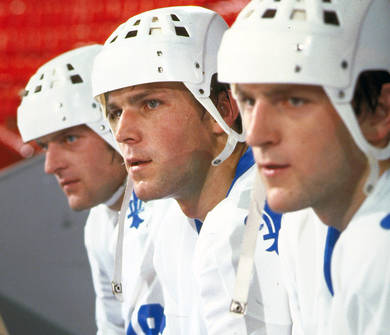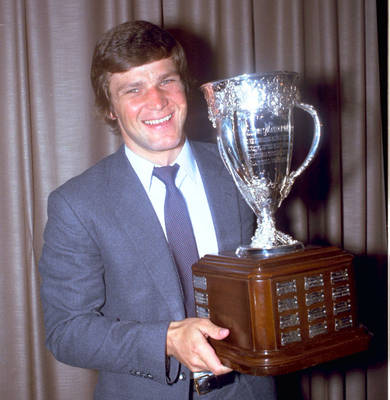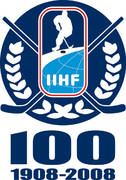Story #46
August 24, 1980 – Innsbruck, Austria
Everybody knew that the four-team European Cup finals in Innsbruck, Austria, in 1980, would be a cakewalk. Soviet national team head coach Viktor Tikhonov was still fuming after the shocking loss to the United States in the Lake Placid Olympics only six months earlier.
Tikhonov was also the coach of the CSKA Moscow club team and the Innsbruck event was his first opportunity to avenge the Olympic debacle. With most of the national team players on the CSKA roster, the Soviet champions defeated Finnish Tappara Tampere 8-0, Czechoslovak Slovan Bratislava 11-1 and Sweden’s MoDo Ornskoldsvik 7-1. CSKA was once again European club champion.
For the 24-year old Slovan player Peter Stastny and his younger brother, Anton, the scores didn’t really matter. Prior to the trip to Innsbruck – on the Communist side of the Iron Curtain – Peter and Anton talked about contacting the Quebec Nordiques, the new NHL club that had drafted Anton just one year earlier. Peter, one of the best forwards in the world and a member of the Czechoslovakian national team since the 1976 Canada Cup, was undrafted, but he was convinced that the Nordiques would love to have them both.
During one of the first nights in Innsbruck, Peter and Anton left the Slovan hotel to find a public phone booth. Peter made sure that he had a pocketful of Austrian Schillings for the overseas call. He had written down on a small piece of paper a telephone number he had seen in an NHL media guide – area code 418 and then 529-8441, the switchboard of the Nordiques hockey club.
Peter was the one who did the talking, and Anton nervously looked around making sure that no one was watching. From the media guide they understood that the main person with the Nordiques was someone named Marcel Aubut, and Peter asked the receptionist to connect him with the club official.
When club president Marcel Aubut was told that “someone named Peter Stastny was calling from Europe”, he immediately took the call. Peter managed to tell Aubut in broken English that he and Anton were in Austria, that they both wanted out to play in the NHL, and that it was possible to defect while they were out of Czechoslovakia. Peter followed with a question: “Do you want me and my brother to play for the Nordiques? We only come in pairs. But hurry, the tournament ends on August 24.”
Stastny could sense the excitement on the other end of the line. For the Nordiques two world class players would be a godsend. In their first NHL season, the season that had recently ended, Quebec finished dead last in its division with 25 wins and 44 losses. Aubut quickly realised that the brothers were just what the struggling expansion club needed.
Aubut told Peter to stay put and that he and another club official were coming to Innsbruck on the next flight. Marcel Aubut and director of player development Gilles Leger arrived in the Austrian city roughly 24 hours later. In the evenings, after the games, Peter and Anton sat in covert negotiations with the two Canadians, and it became clear that the Nordiques officials would not leave without Peter and Anton.
Once the brothers had agreed to defect, Peter called his pregnant wife Darina in Bratislava and told her to come to Innsbruck. The last game of the tournament was on August 24 at 19:00, and the score was lopsided – CSKA beat Slovan, 11-1. After a post-game meal, the Slovan team bus was scheduled to depart from the hotel parking lot at midnight. All players were there, except for the brothers.
Peter, his wife, and Anton were already in Aubut’s car on their way to Vienna where they arrived early in the morning of August 25. The moments of defection – including an after midnight search for Anton who suddenly got lost for an hour in downtown Innsbruck – were in Peter’s words “the scariest moments of my life. It was like being part of a John le Carré novel.”
Aubut had already organised the necessary immigration papers with the Canadian embassy in the Austrian capital and after spending some hours at the Hotel Intercontinental in Vienna, the party took off for Quebec City, via Amsterdam and Montreal.
When the news broke, the sensational story grabbed headlines around the world. Players from Czechoslovakia had defected before (Vaclav Nedomansky, Richard Farda) but no escape was more dramatic. And no defection would have a bigger impact on hockey than Peter and Anton Stastny’s decision to leave Bratislava for Quebec.
With the Stastny brothers (the third, Marian, joined them one year later), the Nordiques immediately became one of the most exciting teams in the NHL. Peter would play a full decade with the club, scoring over 1,000 points in 737 games while Anton had nine seasons with 636 points in 650 games.
As the Nordiques relocated to Colorado in 1995, Peter will forever remain as Quebec’s all-time scoring leader, with Anton third on the list. But it wasn’t the points in the game summaries that make this a top story — it was the gut-wrenching and brave decision to abandon a system you didn’t approve of, and to continue to live and play in freedom.
As part of the IIHF's 100th anniversary celebrations, www.IIHF.com is featuring the 100 top international hockey stories from the past century (1908-2008). Starting now and continuing through the 2008 IIHF World Championships in Canada, we will bring you approximately three stories a week counting down from Number 100 to Number 11.
The Final Top 10 Countdown will be one of the highlights of the IIHF's Centennial Gala Evening in Quebec City on May 17, the day prior to the Gold Medal Game of the 2008 World Championship.
These are the criteria for inclusion on this list: First, the story has to have had a considerable influence on international hockey. Second, it has to have had either a major immediate impact or a long-lasting significance on the game. Third, although it doesn't necessarily have to be about top players, the story does have to pertain to the highest level of play, notably Olympics, World Championships, and the like. The story can be about a single moment — a goal, a great save, a referee's call — or about an historic event of longer duration — a game, series, tournament, or rule change.
|
 |
Click here for the 100 Top Stories
|











